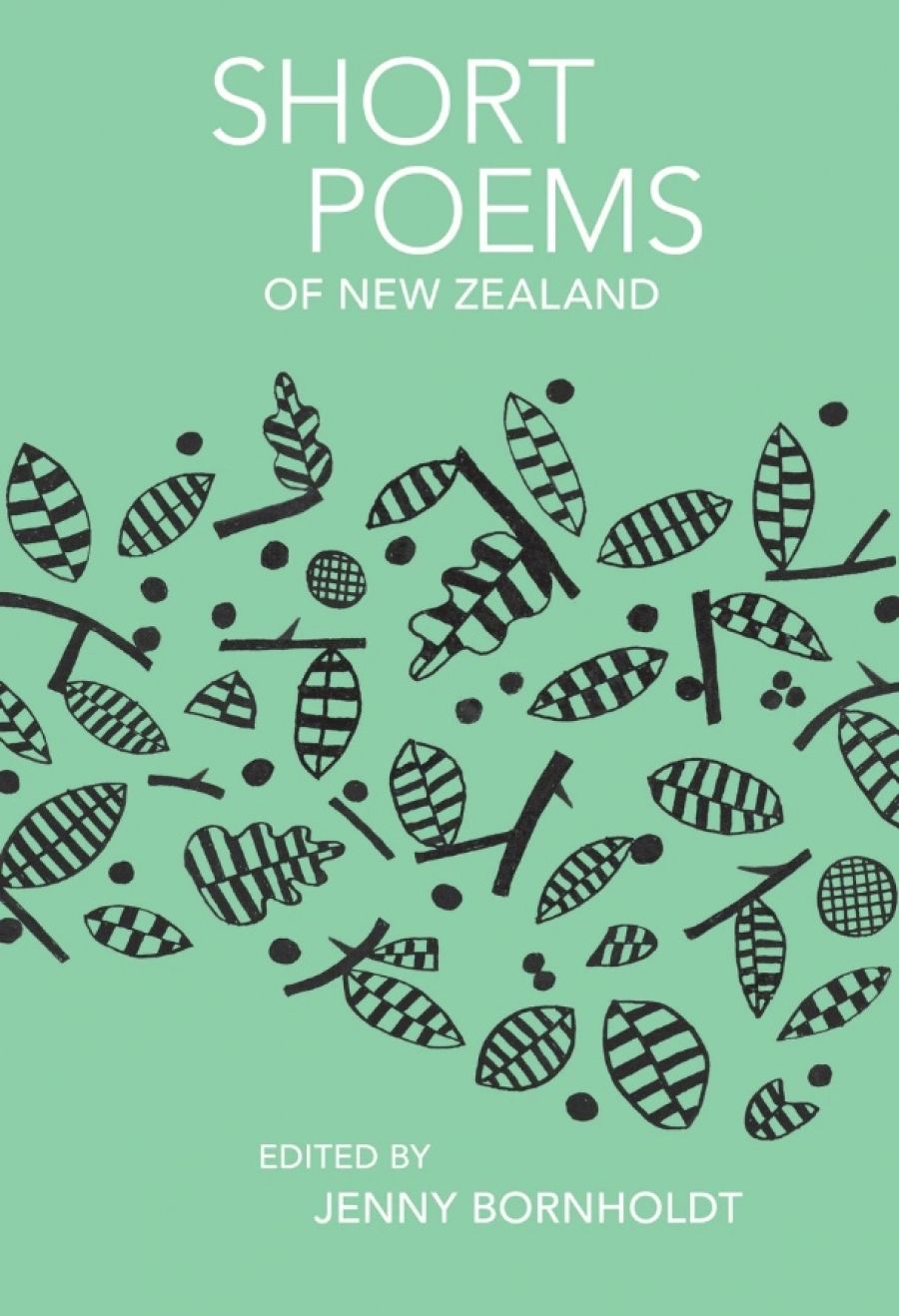
- Free Article: No
- Contents Category: Poetry
- Custom Article Title: Joan Fleming reviews <em>Short Poems of New Zealand</em> edited by Jenny Bornholdt
- Review Article: Yes
- Online Only: No
- Custom Highlight Text:
A new anthology of bite-sized New Zealand poems is freshly out from Victoria University Press. VUP is the Wellington-based publisher closely associated with the University’s renowned creative writing school, known affectionately (or pejoratively, depending on your affiliation) as ‘The Bill Manhire School’ ...
- Book 1 Title: Short Poems of New Zealand
- Book 1 Biblio: Victoria University Press, $38.95 hb, 175 pp, 9781776562022
A fine short poem has superior snapshot capabilities. It can be an atmosphere capsule, like Denis Glover’s perfectly morose portrait of ‘Wellington at 5 O’Clock’, only four lines long:
Where they might stand and throw
Applecores down ships’ funnels,
People walk dully home
Up steps, or go through tunnels.
Admittedly, it is difficult for me to separate this poem’s oppressive atmosphere from my own lived experience as a public servant, stepping out the front door of the Department of Internal Affairs to an early dark in a damp and quietening city. It is one of many poems set in concrete in the walkway along Wellington’s waterfront, and I probably trod it many times on that gloomy walk home.
A handful of the anthology’s most famous poems will be well-known to those who have lived or studied in New Zealand with at least one ear tuned to the literary world. One poem I feel is ‘mine’ – mine, and every other New Zealander’s – is James K. Baxter’s ‘High Country Weather’: ‘Alone we are born / And die alone …’ I might run out of fingers if I tried to count the times I’ve heard this recited aloud.
Baxter’s poem is a moving meditation on life, death, and surrender. It’s a tall order for a short poem, and there aren’t many of this ilk. C.K. Stead’s pithy punch of wisdom in ‘On Turning Seventy’ comes close. Lynley Edmeades’s ‘East Belfast’ manages to accomplish a layered meditation on big themes of history and forgetting, and Michael Harlowe’s ‘Not less by dreaming more’, among others, rewards rereading.
Most of the short poems, however, are little bursts of language in the mouth, to be popped in and quickly swallowed. Some of the short poems are pure jokes, with punchline intact, like Bernadette Hall’s ‘Cromwell’ and Murray Edmond’s ‘Cookbook’. Frances Samuel’s ‘Anorexia’, a mere five words, is a dark joke that turns on rhyme: ‘electric doors / don’t sense her’. Are these mere jokes? Hall’s poem expresses feigned confusion at encountering a statue of Oliver Cromwell outside Westminster Abbey, when all the speaker knows of Cromwell is the name of her hometown. The poem might seem wilfully ignorant, but it’s a joke about ignorance, about cultural relativism, parochialism, and New Zealand’s isolation from the rest of the world. Edmond’s poem ribs, not without fondness, the myths of Sunday school by punning on the subtitle of the baking cookbook every New Zealander knows: ‘At Sunday School / I rose to read: / Sure to Rise.’ Beneath the joke is the awareness of religion’s diminished power in our current moment, compared to its centrality in the time of our grandparents.
What else is distinctively New Zealand about the anthology, besides being a bunch of poems from New Zealand? Despite ongoing arguments about the negligible cultural differences between Kiwi and Aussie culture, this is not a collection of poems that could have been assembled anywhere else. A Rob Hack poem is titled ‘Bring your camera ay?’, summoning the unique cadences of Kiwi speech. The poems are threaded with the specificity of place names: towns and beaches and mountain ranges. There are recognisable low-culture icons, like Ian Wedde’s paean to ‘Tony’s Tyre Service.’ Te reo Māori, the Māori language, is present throughout, composing entire poems or seamlessly integrated into the dominant English. Māori and Pasifika writers like Alistair Te Ariki Campbell, Albert Wendt, Hone Tuwhare, John Pule, Tusiata Avia, and Hinemoana Baker are in attendance.
 Editor Jenny Bornholdt (photograph by Deborah Smith/Victoria University Press)
Editor Jenny Bornholdt (photograph by Deborah Smith/Victoria University Press)
There is also the proximity of all the poems in the anthology – like all the towns and cities of New Zealand – to the sea. An environmental consciousness arising from a close attention to the natural world is found in the short poems of great-grandparent figures like Ruth Dallas, as well as contemporary elders and caretaker-poets like Dinah Hawken and Brian Turner. Grief at the disintegrating environment is surely a natural response to New Zealanders’ love of beach trips, tramping, and time in the bush.
The intelligence of Bill Manhire, of course, is generously represented. His ‘My World War I Poem’ is less a haiku, an image stilled, than it is a circling metaphor: ‘Inside each trench, the sound of prayer. / Inside each prayer, the sound of digging.’ Manhire stands out as the rara avis who manages to complicate and freight a short poem, for example, with ‘The Elaboration’ – although Ashleigh Young is a fierce contender, well-placed on this facing page. Still, the nine-lines-or-fewer rule does not allow for the unsettling genius of Manhire’s swift code-switching, or the dreamlike childhood houses that his speakers walk into, all questions and opening doors.
This anthology is a treasure. In beautifully designed hardcover, it makes for a thoughtful gift for anyone who loves poetry, or hasn’t discovered it yet. Yes, some of the poems are ‘so laid back they’re lying down’, as the old joke about New Zealand poetry goes. Younger, more irreverent, hot-blooded New Zealand poets aren’t present, and there isn’t much space within these pages for knottiness, weirdness, or sustained philosophy. A tone of sweetness and prayerfulness predominates. However, though the poems are small, they are not slight. This is an anthology packed with significance and thought.


Comments powered by CComment